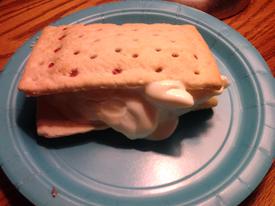Help me explain calories and weight gain/loss
Replies
-
I'm guessing you are doing this whole "grams of food = grams of body weight" thing because you enjoy stirring up a hornet's next.
That's the only explanation as to why you aren't seeing that food is fuel and calories are measuring how much energy is stored in the fuel.
Completely different example, and one so simple you must be able to understand it....
You can power a warship with 1 pound of nuclear fuel, say plutonium. Or you could power it with 10 tonnes of firewood. Does the firewood weigh the same as the plutonium? NO but the plutonium delivers a lot more energy. Has no basis on what they weigh.
"Life is tough. Life is tougher when you're being stupid."0 -
It is not about how much the food weighs it is about the engergy it can produce.
1litre of water weighs the same as 1litre of petrol. Your car can convert the petrol to energy to drive, they both weigh the same but have diferent energy values.
100g of potato chips have more calories than 100g of carrots. They both weigh the same but one will provide more energy for your body. The energy your body does not need is stored for later as fat.
I hope that helps.0 -
I'm guessing you are doing this whole "grams of food = grams of body weight" thing because you enjoy stirring up a hornet's next.
That's the only explanation as to why you aren't seeing that food is fuel and calories are measuring how much energy is stored in the fuel.
Completely different example, and one so simple you must be able to understand it....
You can power a warship with 1 pound of nuclear fuel, say plutonium. Or you could power it with 10 tonnes of firewood. Does the firewood weigh the same as the plutonium? NO but the plutonium delivers a lot more energy. Has no basis on what they weigh.
"Life is tough. Life is tougher when you're being stupid."
I take in 100g of food, which is fuel, the fuel is burnt, the remainder of this is stored but is heavier then the original form it entered the body in? How is this possible?0 -
because it is not the weight of the food but its energy output that matters.
all food is not equal and should be measured by energy density rather than weight.0 -
Just do what you've been doing and let him eat light weight foods and see who gets where in the long run.
+1 I like this 0
I like this 0 -
I take in 100g of food, which is fuel, the fuel is burnt, the remainder of this is stored but is heavier then the original form it entered the body in? How is this possible?
You are locked on to the "why" and refuse to read and understand all the examples that have been given to you.
It doesn't matter HOW IS IT POSSIBLE if you refuse to understand the weight of the fuel has nothing to do with how much energy will be used and how much unspent matter is left over.
In my example of using wood to power a warship I suppose YOU would look at the wood and say "I added a ton of wood to my ship so my ship must weigh only 1 ton extra". What if the wood absorbs some water? Its still the same amount of wood but now it weighs a lot more! Same amount of energy but it now makes the whole ship weigh more!0 -
Ok.
Fat contains 9 calories per gram
Protein and carbohydrate are both 4 cals per gram
Alcohol is 7 cals per gram.
That is how much energy you will get from those different basic building blocks. So as you can see, the weight of the food is less of an issue that what it is made of. You get over twice as many calories per gram of fat than you do of carbs or protein.0 -
I take in 100g of food, which is fuel, the fuel is burnt, the remainder of this is stored but is heavier then the original form it entered the body in? How is this possible?
its not, and it doesn't work that way. However, if that 100g of food is high in sodium or pure protein, its going to affect the water levels in your body and may cause you to retain more water. problem is we never overeat in the form of 100g portions. 100g is a small (or even half) of a chicken breast. its the pre-cooked weight of a quarter pounder patty.
At this point I think you're either ignoring half of the responses or being deliberately obtuse. you will not gain 2kg if you eat 100g of lard. you won't even gain 105g if you eat 100g of lard. but when people over eat, they don't over eat by "just" 100g of something. They also follow that up with a can of soda (150 calories), the bun on that quarter pounder? worth about the same # of calories as the beef patty (because its not a bun, its a piece of cake with sesame seeds and no frosting). There's the fries (starch and fat - 500 calories, and it weighs a lot more than 1/7th of a pound).0 -
Added to what I have said. A lot of food, especially vegetables and fruit are mostly water. The solid weight of them is relatively little, so 100g of salad will have very little you actually absorb. On top of that, fruit and veg have fibre, which your body doesn't digest. Meat, on the other hand, is mostly protein and fat and your body finds those very easy to digest, so it all gets used as energy or stored as fat.0
-
Hi there,
Sorry your answers are not helpful at all.
Example, 100g food item is 25% fat = 25g fat = possible weight gain of only 25g.
bump0 -
This topic has got me thinking - which has to be good!
I will brace myself for everyone disagreeing with me (as I could have got this wrong), but the awkward other half is NOT wrong! Noone weighs more than the TOTAL weight of ALL the food they have eaten plus ALL the drink they have drunk. It would be impossible surely.
BUT - the examples focus on individual items of food.
As efwolfcub said:problem is we never overeat in the form of 100g portions..... when people over eat, they don't over eat by "just" 100g of something. They also follow that up with a can of soda (150 calories), the bun on that quarter pounder?
So, as I understand it. Your body needs a certain amount of calories to fuel it. (Here I am reminded of an experiment we did in school where you set fire to food items like a peanut to see how long it burns for). This level depends on your size/how active you are etc etc. If you eat less than this your body has to use energy stored in your body to fuel itself. This could be energy from fat stores, or other parts of your body including muscle tissue. Thus you loose weight.
If you eat MORE than this number of calories, your body stores the excess. Not just the excess of the 100g of light weight crisps, but also all the other foods you eat that day. (And as different foods take different lengths of time to digest this might be longer than just a day I guess). It might also mean that foods that are normally passed out of your body as waste hang around, adding more weight - so vegetables which weigh a lot compared to their calorie value usually pass out as water and fibre, but this might get added to your cells instead.
Human "fat" is not just made of fat from food. Your body is clever and can turn just about any food stuff into body "fat".
The waste part is the most important I think. Calorie dense foods can be light in weight, but a high percentage of them will be kept in your body. Less dense foods (i.e. veg) weigh more, but a high percentage will pass out of your body - leaving less weight behind than the original light weight food. I think!!
So I guess what I am saying is that if you eat MORE calories than you need you will put on weight as it will not get burned by your body. But that weight gain will NOT be more than the total weight of the food you eat - BUT that is ALL the food you eat, not just the one item that pushed you over the limit. And you do not get a fully clean slate the next day.
There is a whole other debate to be had about the efficiency of burning different foods, but I have no clue about this and need to keep thinking!!
Jodye0 -
I wanted to give this another crack:
You are a rocket NASA needs to launch into space so you can get to the moon and back. (RIP space shuttle program D':)
The astronauts can fill your 100 gallon gas tank up with one of three fuels: regular petrol, rocket fuel or a brand new, ultra-dense fuel called PlazmaTeq.
Regular petrol has the chemical makeup to get you halfway to the stratosphere. If you fill up with it, you will burn through the fuel at 30 miles up and plummet back to earth. Since space is another 30 miles above your peak distance, this isn't gonna cut it.
Rocket fuel is perfectly formulated so that 100 gallons in your tank will get you to the moon and back safely with a 10% reserve for potential emergencies. But it's been calculated so precisely that this 10% is highly unlikely to be utilized. Rocket fuel is the smart choice!
Now, there's this brand new stuff, the PlazmaTeq! You can fill up your tank with that and it's so concentrated that you could make TEN trips to and back from the moon! It weighs the same as rocket fuel! This is the clear winner. HOWEVER...there is a caveat. You MUST drain the liquid and begin an intense 14-day cleaning routine on the tank once you return because PlazmaTeq is so dense that it will form a resistant goo on the inside of the fuel tank, clogging it up and making your rocket heavier, therefore adversely affecting ALL future trips to the moon, throwing off the aerospace engineers' precise calculations and making all future trips dangerous. The good news is, instead, you can simply fill just 1/10th of the tank with PlazmaTeq and get the same trip specs as you do with the rocket fuel! Crisis averted!
So, petrol is like a salad.
Rocket fuel is like a balanced meal of boneless, skinless chicken breast with some broccoli and half a baked potato.
PlazmaTeq is 30 strips of full-fat bacon and a block of full-fat cheddar.
Each of these foods has the ability to nourish your body, but (regardless of what physically weighs more) will fuel your body in different ways. We measure these differences with a thermodynamic (heat-measuring) unit called calories.
I really hope that helps. It was the best I could figure.
:drinker:0 -
Well...
Our body burns calories like a fire.
Healthy foods are like kindling and paper, the body burns them fast and efficiently, turning them to ashes quickly.
However heavy, high calorie foods are like big, huge, green logs. The body struggles to burn them down, so it just singes the outside and leaves you with giant lumps of black coal (fat).
So the higher calorie content the food is, the denser it is and harder to burn so our bodies store it.
The lower calorie is light and easy to burn, so it quickly runs out and has to burn fat.
Ehh.
Forget it :P I'm not making sense!
Agreed!!! :smokin:0 -
you're kidding right? so drinking a quart of water would make you gain 2 pounds according to your partner?
your body burns food as fuel. You don't have potato chip cells or hamburger cells in your body. for food storage at least, you have
fat cells - everything you do burns calories that are stored by those fat cells.
1 gram of fat = 9 calories
1 gram of carbohydrates = 4 calories
1 gram of protein = 4 calories
so, having a kilogram of lard would be 9000 calories, but a kilogram of potatoes would be about 4000 calories.
make sense?
[/
quote]
bump.0 -
I'm going to try to make it as simple as possible!
1) food is made up carbs, fat, and/or protein.
2) each one of these nutrients is worth a different amount of calories
3) all the nutrients combined in the food give it a caloric value.
4) your body turns CALORIES into ENERGY, it does not put the mass of food straight onto your body!
For example, 1g of fat is 9 calories, but 1g of protein is only 4 calories. Your body can only use and store what is there! Eating 100g of protein would be less calories than 100g of fat.0 -
So no one has an answer as to how it gains more mass when its stored?
Everyone is simply saying food is either stored or burnt.
What I want to know is how does it get heavier when stored?
Maybe I will email our Army nutritionist and put the same questions to her.
Thank you for the replies, we will continue our circular discussion at home, can a mod please close this thread.
It does not get heavier! The weight of the food does not matter. A lot of some food's weight is water actually (meat, tofu, veggies)! Food is made up of ENERGY, or rather potential energy, it needs to be digested to turn into energy. Calories are a measure of energy.
Say you expend 400 calories today living (completely made up number). If you ate 100g of protein that day, which is 400 calories, you would not gain or lose. But if you ate 100g of fat, which is 900 calories, you would have 500 unused calories stored as fat (or glycogen but let's not get into that). Even though both portions were 100g, one had more energy than the other and your body didn't use that much.
This is why protein dense foods have less calories than fat or carb dense foods. It's just the molecular make-up of the nutrient.0 -
There seems to be a lot of confusion about this. Has anyone tried to just eat potato chips, then just eat hamburgers and compare?
OP, I suggest the ONLY way to settle this. One pick burgers one pick chips. Try it out for a week, then get back to us all on who lost more weight.0 -
1litre of water weighs the same as 1litre of petrol. Your car can convert the petrol to energy to drive, they both weigh the same but have diferent energy values.
No, they do not.
1L petrol - 737 grams
1L water - 1 kg0 -
Well...
Our body burns calories like a fire.
Healthy foods are like kindling and paper, the body burns them fast and efficiently, turning them to ashes quickly.
However heavy, high calorie foods are like big, huge, green logs. The body struggles to burn them down, so it just singes the outside and leaves you with giant lumps of black coal (fat).
So the higher calorie content the food is, the denser it is and harder to burn so our bodies store it.
The lower calorie is light and easy to burn, so it quickly runs out and has to burn fat.
Ehh.
Forget it :P I'm not making sense!
this explains it well0 -
everyone did a great job explaining it but he may need a more simple version I would start by showing him a basic child level video on food and nutrition to make it easier to understand for him0
-
its lovely that you think that, but you're simply incorrect. you body digests the fat, the carbohydrates, etc
She doesn't think that, her partner does.0 -
I'd take a different approach altogether. Rather than trying to explain it to HIM, I'd look at him with a raised eyebrow, and say:
"OH REALLY??!! Go ahead mister. . . get busy with Saint Google and find some evidence that your ridiculous theory is true. Geez -o-pete!"0 -
sdokeefe,
there is NO foodstuff in the world that will make you gain more weight in bodyfat than the weight of the foodstuff itself.
In case you did not get it first time around,
THERE IS NO FOODSTUFF IN THE WORLD THAT WILL MAKE YOU GAIN MORE WEIGHT IN BODYFAT THAN THE WEIGHT OF THE FOODSTUFF ITSELF.
Now do you understand?0 -
0
-
I'm kind of surprised by just how much people are being *kitten*. I think he brings up a somewhat valid point that many of the people offering explanations seem to ignore. Mass cannot be created or destroyed. So if you ate/drank a pound of food, your weight gain could not exceed one pound. Here is where I think that he is having an issue, and other people have pointed this out: all foods are not equal and for a food like celery, most of the weight you are eating is water. If you ate 1 lb of chips, you would be eating 2240 calories, whereas if you ate a lb of celery, most of the weight comes from water and there would be less than 100 calories. As others have explained proficiently, calories are a unit of energy that describes how much energy is in the food. You can think of the calories as the portion of the food that the body can use/store. Obviously in my above example, the chips have far more calories, so more of the lb that was eaten would be stored in your body than the celery. In neither case could you possibly gain more than a lb, but the amount gained (assuming for simplicity that absolutely no energy is expended by the body) would be different in those cases.0
-
3500 calories equals one pound. If you five up 500 calories per day you can lose 1 pound a week. If you over eat 500 calories per day you can gain a pound a week. A pound of lean beef has less than 1000 calories so no way is your partner's theory correct.0
-
 cool 0
cool 0
This discussion has been closed.
Categories
- All Categories
- 1.4M Health, Wellness and Goals
- 398.1K Introduce Yourself
- 44.7K Getting Started
- 261K Health and Weight Loss
- 176.4K Food and Nutrition
- 47.7K Recipes
- 233K Fitness and Exercise
- 462 Sleep, Mindfulness and Overall Wellness
- 6.5K Goal: Maintaining Weight
- 8.7K Goal: Gaining Weight and Body Building
- 153.5K Motivation and Support
- 8.4K Challenges
- 1.4K Debate Club
- 96.5K Chit-Chat
- 2.6K Fun and Games
- 4.8K MyFitnessPal Information
- 12 News and Announcements
- 21 MyFitnessPal Academy
- 1.5K Feature Suggestions and Ideas
- 3.2K MyFitnessPal Tech Support Questions
















